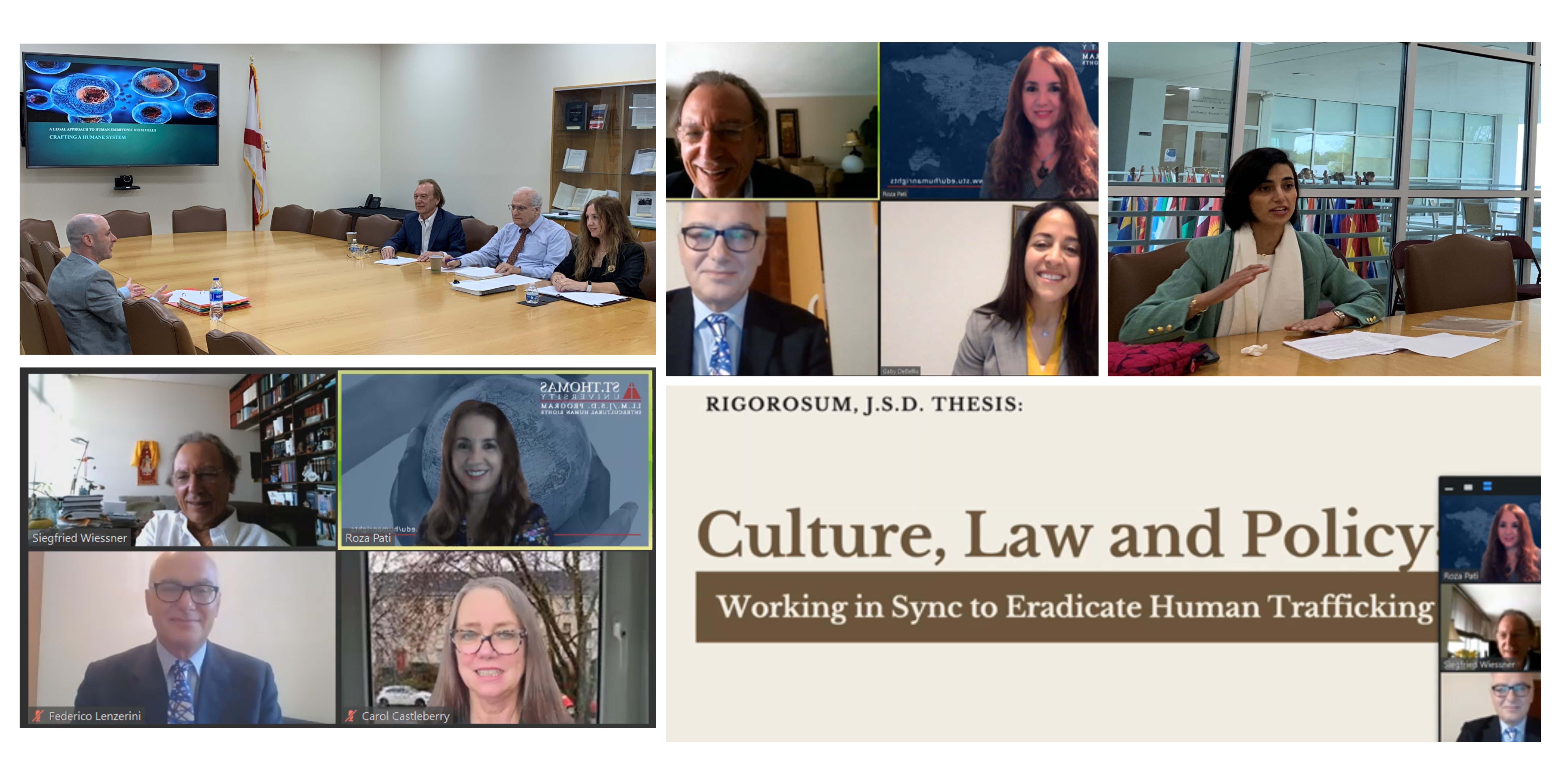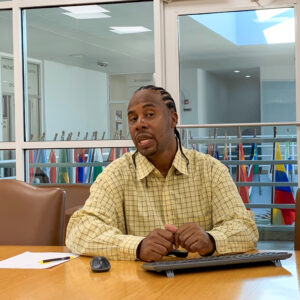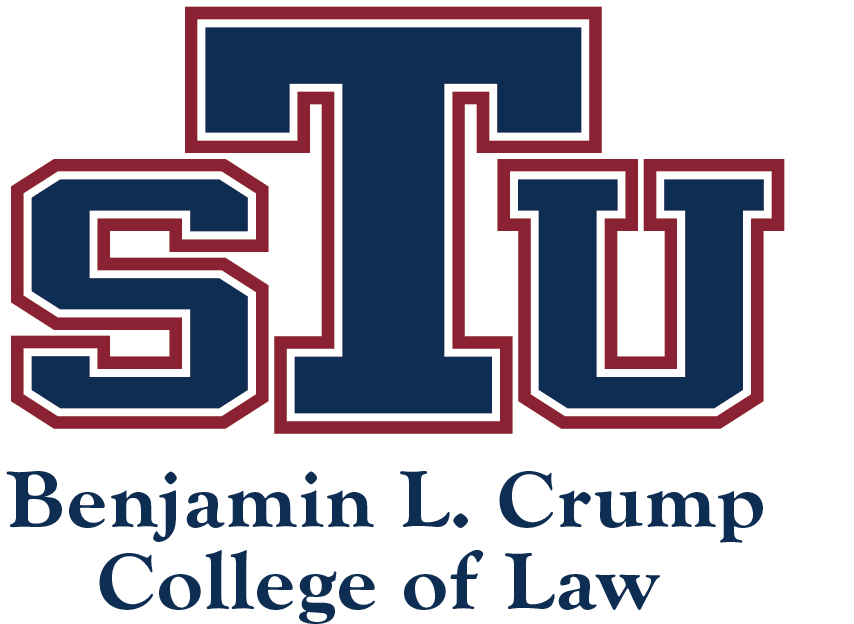Rigorosum – J.S.D. Candidates Defend Their Dissertation!

Doctoral candidates of St. Thomas Law’s J.S.D. in Intercultural Human Rights program deliver their dissertation oral defense, the rigorosum. The rigorosum is the high point of an academic career in the global university tradition and an exhilarating educational experience for candidates.
The candidates delve deep into the main contributions of their legal research for decision makers and practitioners and to the existing legal literature. They discuss the novelty they bring as they present the problem; identify and probe into the conflicting claims, their claimants, perspectives and basis of power; analyze past trends in decision and their conditioning factors; identify and analyze future trends; appraise past decisions and recommend solutions in light of building a public order of human dignity – a society whose law, policy and practice has human flourishing as its goal.
Below we feature two candidates that defended their dissertations in Spring 2024.
Justified Normativity: Substance, Process, and Purpose of the Law of Unilateral Armed Humanitarian Intervention By Keith Puls
 This dissertation provides an alternative to the shaky foundation of state-centric international law norms. It uses a theistic natural law basis to provide the material source that underlies an international law norm to support a decision by a state to use military force to prevent or stop egregious crimes by a state against its own people, to include genocide or crimes against humanity. When the U.N. Security Council fails to take action on its primary responsibility under Article 24(1) of the U.N. Charter, the authority to take action to protect the victims of those crimes remains with the member states. Several Case studies are used to demonstrate the level of crimes necessary, the application of the law using a Just War Tradition construct, and the influence of policy or other diplomatic factors considered when action is otherwise legal under this approach.
This dissertation provides an alternative to the shaky foundation of state-centric international law norms. It uses a theistic natural law basis to provide the material source that underlies an international law norm to support a decision by a state to use military force to prevent or stop egregious crimes by a state against its own people, to include genocide or crimes against humanity. When the U.N. Security Council fails to take action on its primary responsibility under Article 24(1) of the U.N. Charter, the authority to take action to protect the victims of those crimes remains with the member states. Several Case studies are used to demonstrate the level of crimes necessary, the application of the law using a Just War Tradition construct, and the influence of policy or other diplomatic factors considered when action is otherwise legal under this approach.
Keith Puls is the Principal Deputy Legal Counsel at U.S. Southern Command in Miami, Florida. Before assuming his current position he served for 20 years on active duty with the U.S. Army as a Judge Advocate. The views presented are those of the author and do not necessarily represent the views of the Department of Defense or its components.
Challenges to the Development of an Effective Human Rights System in Jamaica
By Donovan A. McFarlane
 Developing countries across the globe continue to struggle with human rights attainment and with establishing an order of human dignity. This does not mean that the developed countries lack incidents of human rights violation, but they are far ahead in their implementation. The challenge to the expansion of international human rights remains with developing countries and their political, legal, and governance systems. The real implications of such challenges extend into sociocultural, economic as well as historical factors that hamper the authentic adoption and development of effective human rights systems. Jamaica is an example of a developing country stymied by the foregone factors in meeting its obligations under international human rights law. This study examines the challenges to the development of an effective human rights system in Jamaica, and it reflects the commonalities of legal and policy challenges in the developing world. Using the New Haven School of Jurisprudence, this study identifies the challenges to Jamaica’s fulfillment of human rights, particularly those of the most vulnerable groups such women, persons with disability and the LGBTQ, and it presents recommendations for building a better order of human dignity for all.
Developing countries across the globe continue to struggle with human rights attainment and with establishing an order of human dignity. This does not mean that the developed countries lack incidents of human rights violation, but they are far ahead in their implementation. The challenge to the expansion of international human rights remains with developing countries and their political, legal, and governance systems. The real implications of such challenges extend into sociocultural, economic as well as historical factors that hamper the authentic adoption and development of effective human rights systems. Jamaica is an example of a developing country stymied by the foregone factors in meeting its obligations under international human rights law. This study examines the challenges to the development of an effective human rights system in Jamaica, and it reflects the commonalities of legal and policy challenges in the developing world. Using the New Haven School of Jurisprudence, this study identifies the challenges to Jamaica’s fulfillment of human rights, particularly those of the most vulnerable groups such women, persons with disability and the LGBTQ, and it presents recommendations for building a better order of human dignity for all.
Donovan A. McFarlane is Lecturer in Department of Politics and International Relations (American Government, The Legislative Process, and The Presidency) in the School of International and Public Affairs (SIPA) at Florida International University, and Adjunct Professor at Barry University and St. Thomas University.
The J.S.D. Program in Intercultural Human Rights aims at providing a premier opportunity for promising human rights scholars to make a lasting contribution to the dynamic and action-oriented field of human rights through researching, analyzing and offering solutions to cutting-edge issues both globally and domestically.

